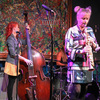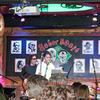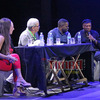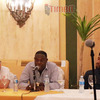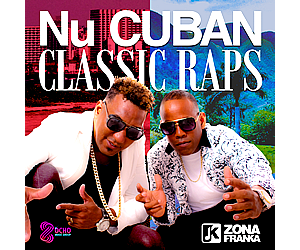Archivo
Lo Nuevo[hide]
Reportes: From The St... : Jazz Plaza ...
Fotos: Tom Ehrlich : Irakere 50th Annivers...
Fotos: Tom Ehrlich : Irakere
Resenas: Joey Altruda Presents: El Gran ...
Reportes: From The St... : Cubadisco 2...
Timbapedia: 09. Interviews -... : Carlos del Pino ...
Fotos: Tom Ehrlich : 2023 Monterey Jazz Fe...
Fotos: Tom Ehrlich : 2023 Monterey Jazz Fe...
Fotos: Tom Ehrlich : 2023 Monterey Jazz Fe...
Fotos: Tom Ehrlich : 2023 Monterey Jazz Fe...
Grupos: Tirso Duarte
Grupos: Tirso Duarte : Discography
Grupos: Charanga Habaner... : 8. El bla bla bla
Grupos: Pupy y los que S... : Tirso Duarte
Fotos Del Día [hide]
Sin Clave No Hay Na
The New York Mega Timba Concert - Coda
What Does This All Mean For The Future?
(para leer en español oprima aquí)
Story and photos by Bill Tilford, all rights reserved
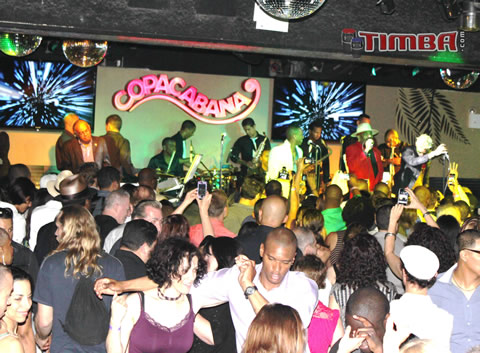
“What we have here is a failure to communicate…….”
As I look at everything that has been happening in the Timba music concert scene in the United States over the past two years, I am reminded of Aesop’s fable about the little shepherd boy who cried “wolf”. For those of you who are not familiar with that story, the short version is that a little shepherd boy falsely warned the villagers about a wolf attack on the sheep in order to bring them running out to the pasture. After he did this twice, and the villagers came running both times only to learn that there really was no wolf, the villagers vowed to ignore him. The third time that he cried out, there actually was a wolf, but the villagers ignored him because of the previous false alarms, and the flock of sheep was lost. In a way, we are faced with a similar problem regarding potential audiences for large Timba concerts in the United States now. There is an atmosphere of understandable skepticism among many of the fans, and those of us who work professionally with the music whether as musicians, agents, promoters, managers, venue owners, writers, media figures etc., will need to put our heads together and try to figure out ways that we might be able to address that skepticism. This problem was already present before the New York concert, which did at least end with a concert. There was also some collateral damage from this event - a lot of discussion in the industry about possible longer tours by individual bands associated with the concert failed to become actual tours.
I have seen and heard comments in other places questioning whether some of the bands originally advertised for the May/June 2012 New York concert were ever really signed in the first place. After examining all of the evidence available to me, it appears that even if all of the original bands had truly been signed and confirmed the number of tickets actually being sold would still not have been enough to permit a concert of the size originally announced, and it still would probably have been economically necessary for the organizers to “downsize” the concert ( although I don’t know the actual number of tickets sold, the change from the Armory to the Copacabana would not have been practical if thousands of people had already been buying tickets). Under these circumstances, it is difficult for me to criticize the fact that a smaller concert was the finished product. However, the handling of the public communications aspects of that process was absolutely horrible.
Since I am also a brass musician myself, I can tell you that since the same brass section was performing throughout the concert, it was probably a good thing that they didn’t play for six full hours – unless the song list was carefully paced to give them plenty of rest, hour six would not have been pleasant for the musicians or the audience. But here again, there was a serious communications failure between the organizers and the ticket holders.
In retrospect, it might have been better for everyone, including the organizers themselves, if they had wiped the slate completely clean after if became clear that the original event at the Armory Arena was not going to go as planned and “re-sold” the Copacabana concert as a completely fresh concept correctly explaining the new lineup, concert length etc. There would have been more administrative time, trouble and expense involved, but there would also have been more public goodwill (and possibly even better ticket sales).
As we go into the future, the burning question now is “What can be done to restore the confidence and enthusiasm of the ticket buying public for Timba concerts in the United States?” In the short run, this writer is going to publicly recommend that U.S. concert organizers think very carefully before attempting any further “Mega-type” events for at least a couple of years. At the moment, there is an atmosphere of public suspicion about these types of events, and failures – even partial disappointments - are poisoning the environment for future concerts. If organizers want to do a Timba concert, the ideal approach is to keep it simple: book one or two bands, and consider whether pairing them with some US-based talent (for an opening act) might help sell more tickets. If a promoter or organizer really wants to proceed with a Timba concert using multiple bands in spite of the current atmosphere and this writer’s advice, then the challenge is to find ways to rebuild public confidence, and that may not be easy. To any of those promoters/organizers, I would say that you really can’t afford to make even little, seemingly insignificant mistakes now – people will be looking for reasons to doubt you, and that will translate directly into lost ticket sales. Perfectionism is now a necessity, not a luxury. If you do make mistakes in spite of your best efforts, fix them immediately. Finally, understand that you are now operating in an environment in which most people are unlikely to buy advance tickets unless you give them a real incentive such as a discount to do so. I would suggest doing a little market research regarding what level of advance purchase discount you need to bring the early buyers back.
I am also going to say something that I realize will make me unpopular in some circles, but it truly needs to be said. Timba music is no place for amateurs. It is among the most difficult forms of music to manage effectively. Just as a lot of musicians lack the knowledge and experience to play this style of music well, amateur agents/promoters/organizers/managers are usually not able to market this music successfully either, and it is bad for the future of the music whenever any Timba concert is a fiasco (poor attendance, bad sound etc.). Unfortunately, in addition to the relatively small cadre of fine and capable professionals who are working to promote and manage Timba tours in the United States, there is also a larger second tier of amateurs who are trying to get into the business, often with good intentions, but without the skills and knowledge needed to do things well. To those of you who are “dabbling” in this music (and you know who you are), I would suggest that even if good intentions and a genuine love for the music are motivating your involvement, It would be better for the bands, the fans and the venues if you would leave the concert business to people who actually know what they are doing, even if that means that it might take longer for a concert to happen in your area. If you want to get into this music, a better way to start is to apprentice with an existing professional, start with a different style of music that is less difficult to manage well, and/or take some of the music management courses now being taught in various schools and colleges. You should learn the basics of how the music business works before attempting to enter one of its most challenging arenas.
To venue owners, if you are already hosting Timba concerts, I salute you, and some of you are doing well with this, but I also feel your pain if you have been on the receiving end of any of the difficulties afflicting this business over the last two years. My advice to you is that if you are considering a band, take a good long look at its US handler(s) as well as the band itself, and if there is bad history (or no history) there, be aware and beware. There are some capable professionals involved in this music, but just like in every other genre, there are also others that you probably shouldn’t be doing business with.
To the bands in Cuba, I say that if an American agent or promoter promises you the world and makes it all sound too easy, that person may be one of those amateurs (or even worse, a tiburon) that you should try to avoid if possible. You should carefully review the experience and history of anyone who wants to represent you in this country and be cautious of those who can’t prove that they are up to the task at hand or who have a bad past record with these events in the United States. Please understand too that unfortunately, in this business, being a “fellow Cuban” does not always automatically give that person the needed combination of honesty and competence. On occasion, some people that you would not want to do business with may attempt to approach you as “friends”.
To the fans in the United States, we say that we understand completely why many of you have become skeptical about these types of concerts, but it is equally true that if an environment develops where everyone waits to buy tickets the day of a concert (or the day before); the concert system for this music will eventually completely collapse. Venue owners and concert organizers make a number of decisions based on audience projections. In an environment where those projections become impossible to make, it becomes easier for venue owners to decide to stay with forms of music that are easier to work with. Therefore, the industry needs to hear from you about what it will take to restore your confidence enough to buy tickets in advance again.
In the near future, I will be resuming my larger series about Timba and the United States. I took a break from that for a while because I knew that the NY concert would contain some lessons, and indeed it did. In the next installment of that series, I will begin to make what I hope will be a series of constructive, positive suggestions to help improve the concert environment in which we are working today, but the most important one can be given here: those of us who are dedicated to the success of this music need to begin considering whether there are ways we can work together to make things better.








